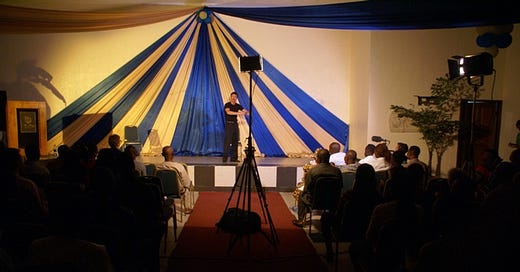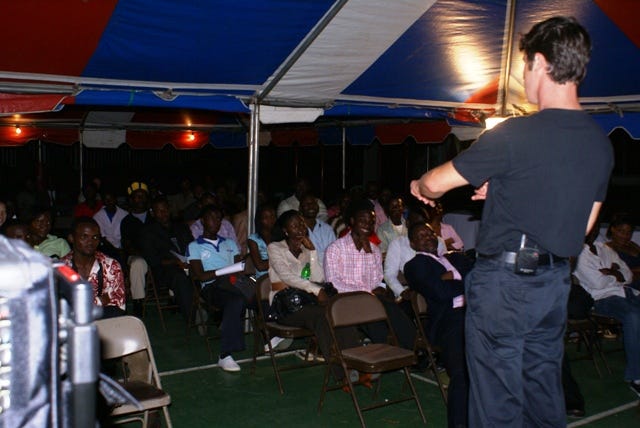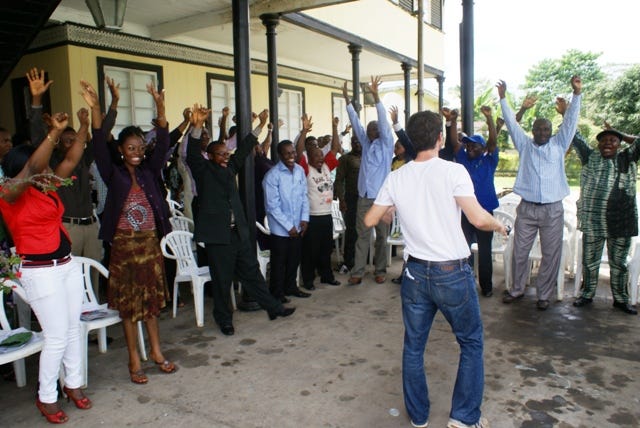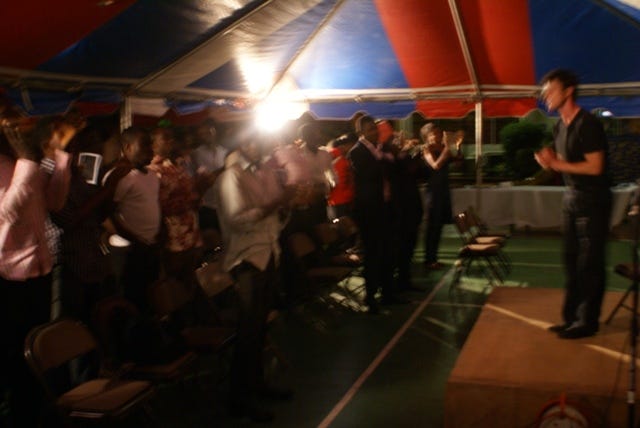For ten days, I was a form of Soft Power
The improbable State Department sponsored tour of Tings Dey Happen in Nigeria
In early 2009, as the Obama administration rumbled into action, I got a call I thought was a prank. A woman with a Swedish accent said “Hello my name is Inga McMichael and I’m calling on behalf of the United States Department of State. “I am calling to ask if you would like to do a five-city tour of your play Tings Dey Happen in Nigeria?”
It was a sunny morning in my apartment in The Mission District of San Francisco, and I was writing and rehearsing a new show. The Swedish accent from the U.S. State Department threw me off. So did the hyper-specific offer in the form of a question. “Yes…?” I stammered. And then, “Wait what? When? Is this real?”
Over the next several months, over Skype calls with U.S. Diplomats in Nigeria, we hashed out the specifics. So in October 2009, I took the stage in Calabar, the jewel city of the Niger Delta, in a hotel baement multi-purpose room. A warm up band had serenaded the room of mostly Nigerians, with a few sweaty ex-pats.
But a Foreign Service Officers paced in the back of the hall. The show had been selected to highlight the promise and challenges of democracy in Nigeria, and to launch conversations about corruption and public accountability. The idea was to shine a creative light on these perennial issues. But when I arrived, after two long flights, some diplomats were getting cold feet. There were new concerns that the show might rile people up in the run-up to the upcoming Presidential elections. (Elections often fomented violence as politicians hired youth gangs to drum up and defend support for their candidacy.) This particular FSO pacing in the back of the room was the leading voice of concern.
So I was performing the first show of what was to be a five-city tour not knowing if the rest of the tour was going to be cancelled. Or if she would throw up her hands, charge the stage and say “Enough! Abuja just called and we have to stop the show!” I was also reacclimating to Nigeria, where I had lived for most of 2005, and performing the show for the first time in Nigeria.
I had performed before for entirely Nigerian audiences in the U.S. The Nigerian students union at Stanford had booked a special show. One night in New York a Nigerian banker had booked the entire theater and then hosted a post-show party at a swanky bar nextdoor in SOHO. So I knew to expect louder laughs during the scenes featuring Nigerian characters, and even clapping and shouting during those scenes, and less laughter during the ex-pat character scenes.
What I didn’t expect was how emotional it would be for me to perform the full show in Nigeria for the first time. I finished the show, did the Q&A, hugged some people I hadn’t seen in years, and had to jog back to my hotel room. I was back in the Niger Delta (not in Port Harcourt, or Warri, or the riverine villages where I had done the research). But still back in the Niger Delta, performing this improbable piece of art, knowing probably somebody in the audience was living what the show portrayed everyday. It was not theoretical, even in a way it could be for Nigerians in the U.S. I was overwhelmed by the honor, and responsibility, and the privilege to be able to carry this story and these characters back to Nigeria. I closed the door in my hotel, and burst into tears.
The next morning at breakfast, I sheepishly asked if the next four shows in Lagos, Bauchi, Jos and Abuja were still on. Apparently the reports back were that it was a nuanced piece of art that was not going to precipate a wave of violence. I had assured the doubters beforehand this was the case, but seeing is believing.
And so we boarded our flight to Lagos for a show later that night. The flight of course was delayed, and there was terrible traffic from the airport. We stopped for quick Gyros in a strip mall in Lagos at around 4pm before a 7pm show. I never normally eat anything that heavy on a show day, and never that close to performing. Sure enough, I was vomiting at 7pm in the bathroom of my hotel, asking if there was a chance the start time could be delayed. It was an outdoor show, the guests were assembled. Couldn’t I just get through the show?
I’ve been thinking a lot about my time as a Fulbright Scholar and then State Department sponsored touring artist in Nigeria. Especially with the news last month that Secretary Rubio is going to be shrinking the State Department, which currently has a budget that is 6% of the Pentagon’s. This after the “wood-chippering” of U.S.A.I.D.
There is a reflexive cynicism towards American Soft Power among some of my friends. As one friend said, “America as a force of good in the world? I hate it when people say that.” And yes, there’s a long roll call of abuses. The toll of Cold War America’s anti-communist fervor, destabilizing left-of center democracies in Latin America and elsewhere. The escalation of Vietnam into a decades-long killing field. The catastrophe of the Iraq War. But especially since the end of the Cold War, there’s been massive humanitarian projects with real results. Even the Shock and Awe George W. Bush administration expanded anti-malarial and H.I.V. Pepfar programs that have saved an estimated 25 million lives.
I got to see the many varieties of State Department employees in my time in Nigeria. There were certainly resentful consular officers, drinking heavily and bitching about Nigerians who lied on their visa applications. They often didn’t know even the most basic phrase in pidgin English, the verb-rich, poetic patois that is the country’s lingua franca (They spent most of their day denying people visas; it was a dreary assignment).
There was the burly ex-Marines who’d served in relief missions in Bosnia and Haiti and had the most detailed map of the Niger Delta I’d ever seen. (I assumed they were CIA or CIA adjacent.) There was the ruminative Ambassador himself, a former history professor who spoke in long, winding sentences but had surpisingly humble curiosity.
The majority of the employees at the Embassy and Consulates in Nigeria of course were Nigerians. They also staffed the so-called American Corners, which were small libraries with books Nigerians could check out—a cool, quiet place to read. They were most visited by women and young students. They did not share the reflexive distrust of American power.
And then there was Cultural Affairs officers like Atim George. On an early visit to Lagos from Port Harcourt during my Fulbright year in 2005, she lodged me in her house and coaxed me to perform excerpts of my previous shows for her and her housekeeper. I obliged, and soon she had me perform some scenes in Lagos for a cultural gathering. She made a point of cultivating meaningful friendships and professional contacts with Nigerian artists, actors, musicians. In Nigeria they would say, “She done try o” She really tried. After performing in Lagos at a gathering she organized, I met an actor and comedian named Tunde, who cracked me up as we talked shop. He said he would keep his eye on me and I agreed to do the same.
But they were still banging on my hotel door before the show four years later and I was wiping vomit from my mouth. Then the voice from the hallway said, “Dan, there’s this comedian Tunde here. He said he knows you. He said he’s willing to riff for a bit if you need more time.” Hallelejiah. God Bless Naija. “Yes that sounds great!” I said. Dry heaving never felt so hopeful.
I could hear Tunde entertaining the crowd while I continued to purge from the second floor of the hotel. Of course it was a Nigerian who saved me. It happens like that all the time.
I took the stage forty-five minutes late, completely dehydrated, still nauseas. But it was a lively, lovely crowd, with lots of young actors, and Tunde had warmed them up. There was lots of laughter, lines repeated, in-scene clapping. And I’ll never forget the chirping of crickets and soft hum of a nearby generator during the pin drop moments.
That tour is still one of the prouder moments of my career. The show was received with huge, heart-warming response. I taught workshops in several cities. We had interesting post-show Q&A sessions with activists, artists, students, journalists, and everyday Nigerians. My favorite comment was from a young activist after the Lagos show who took the mic and said, “If this guy can come all the way from California and do this, it makes me feel I can do more. I have to do more.”
And it was organized and presented by the U.S. State Department. I got to represent my country doing my art form. An art form that is both wholly American in its Whitmanesque/De Tocqueville channeling of voices and perspectives, and yet also wildly uncommercial and niche and bred in a funky black box theater in San Francisco. And yet here it was functioning as a form of Soft Power for the hegemon/superpower U.S. of A. Cultural diplomacy, served up in the unlikeliest of forms. And I know for a fact that the tour changed at least one life. When I was back in Nigeria, I got in contact with Williams, whose story was one of the main throughlines in the play.
I flew Williams up for the final show in Abuja, Nigeria’s capital. The State Department had lined up a television interview to promote the show, so I brought him on with me, and Williams told his story to a Nigerian national TV audience. He caught the eye of Jonathan Mack, a State Senator from the Niger Delta, who was working to create an amnesty program for Niger Delta militants. As I detailed in a previous essay, that eventually led to Wiliams becoming an entrepreneur in the oil industry, and a more secure life for him and his children.
The point is that the State Department continued to engage with Nigeria, it funded and organized a tour, and that led to this reuniting with Williams, the TV appearance, and a connection that changed his life. (There were policy changes in Nigeria and the launch of the amnesty program too that made the timing right.) The U.S. State Department has a very checkered past, and there are certainly diplomats who don’t get down with local people like they should.
But there is good that is being done. There are earnest and intelligent people who are working in difficult jobs to increase opportunities for marginalized people around the world. And a massive contraction or elimination of that will cause a lot of suffering. (A quick search will yield many parts of the world affected, including Gaza food aid, or Colombia’s post-conflict programs that will be devastating.)
Just this morning as I’m about to post this, I got an email from the Fulbright Association that Trump’s 2026 budget proposes to cut international exchange programs by 93%, essentially eliminating the Fulbright program and others like it. (Please write your reps here and tell them you are not ok with this if you can). They are intent on drastically reducing international engagement and exchange. An exchange I am forever indebted too. Nigeria changed my life in so many ways. After the Lagos show, I saw Tunde and thanked him profusely. He beamed. “Noting dey happen, my bruddah,” he said. “It was my pleasure and privilege.” I hugged him. “Same same. I dey feel you o!” I said. I still feel that warmth and joy. And I fear what will happen now that so many of those relationships will be severed.







